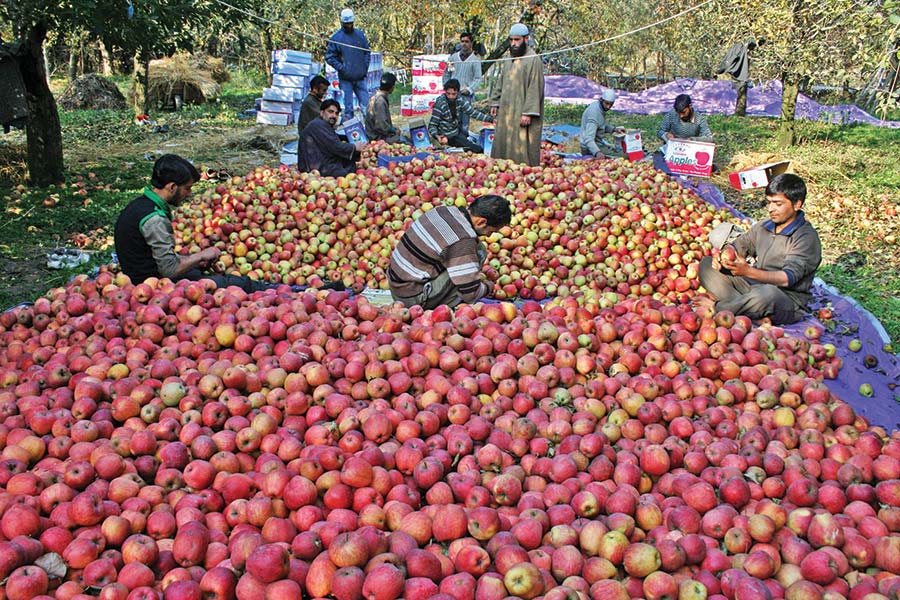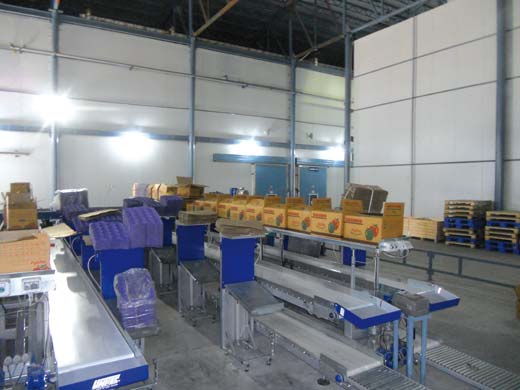With partial lockdown still in place, and around 20 thousand metric tonnes of apple still in CA stores across Kashmir, farmers and traders are looking at huge loses, reports Shams Irfan

In April, when Ghulam Mohammad Bhat, 65, went to a Controlled Atmosphere Storage (CAS) in Pulwama’s Lassipora, to retrieve his produce, he dialled his friends asking them to keep some money handy for him.
He was sure his 4000 boxes of A-Grade Kullu Delicious apples will not fetch him enough money in the market to even pay for storage charges. However, he was saved by the quality of his produce. “I was lucky to get less than half of what I would have got in normal circumstances,” said Bhat.
But not all feel lucky. They find themselves caught between two lockdowns: first after the abrogation of Article 370 in August 2019, and second, since March 2020 to halt the Coronavirus infection. In August 2019, Kashmir remained shut for months in wake of scrapping of Kashmir’s special status by New Delhi. The curfew and communication blackout that followed coincided with apple harvesting season.
As the situation worsened, thousands of farmers across Kashmir waited in despair for it to improve. Instead, visiting orchards became a dangerous exercise for them. All of a sudden Kashmir’s famed apple got embroiled in region’s troubled politics. Even picking of fruit from trees, otherwise a boring and laborious exercise, was seen as a political statement.
Lack of coordination between farmers and traders because of communication blackout only made things worse. Everyone was left onto himself to decide his produce’s fate. Those who started picking apples did so at great risk to their lives.
But it stopped when suspected militants attacked and injured two apple traders in Sopore for defying the ban on trade.
“We delayed picking of apples hoping situation will improve but it didn’t,” said Shabir Ahmad Lone, 55, a Shopian based second-generation orchardist.
When shutdown and restrictions prolonged, farmers from different areas of Shopian, Pulwama and Kulgam rushed to Lassipora, Pulwama, to keep their produce in CA stores. By October end Kashmir’s 30 CA cold stores with a collective capacity of 1.30 lakh metric tonnes were filled to the brim.
“With our year’s hard work and labour in cold stores, we were a bit relaxed,” said Bhat.
But none of them knew what the next year would be like. All they could do was to wait.
Long Wait
For Lone and other small farmers like him with less than a thousand box yearly produce, the decision to use CA cold storage facility, was a risky one. They knew keeping their produce in storage beyond a few months will eat into their profits. But there was no other option.

The apple harvest and grading in progress. KL Image
A 10 kg create of apples stored in a CA facility costs a farmer around Rs 35 a month (including Rs 6 create charges).
“Our apples are in cold stores since October last year. Now you do the maths how much rent we have to pay,” said Asif, 37, a third-generation apple farmer from Pulwama.
Usually, apples stored in CA facilities are taken out in January and sent to different Indian cities as the festive season starts. But given the record snowfall and continuous inclement weather, Asif waited for Srinagar-Jammu highway to clear before risking his 2000 boxes of A-Grade apples.
“People who sent in January lost around 30 per cent of their crop in transit as trucks got stranded for weeks,” said Asif. Such uncertainty forced Asif and other small producers like him to keep their crop in CA stores as it is.
The situation did not get any better in February as well. “We were fighting multiple odds to save this crop. First curfews, then killings of traders and labourers, then untimely snowfall, then road blockade, and now a virus,” said Asif.
However, in the first two weeks of March, when the weather improved a bit, traders managed to send large quantities of fruit to markets in Delhi, Punjab, Mumbai, Hyderabad and other markets.
But since August 2019, traders in big Indian cities knew what kind of situation Kashmiri growers are in, so they began dictating rates and terms of payment.
“They knew it is distress sale since harvesting season. So they took advantage of it,” said a trader from Shopian. Whatever was sent outside Kashmir failed to fetch the desired price or in most of the cases, even recover farmer’s labour.
According to local estimates, because of initial distress sale in September and October, when the harvesting season was on, prices of apple in wholesale markets plummeted by 60 per cent.
“Despite hardships we somehow managed to send apples outside, only to get peanuts in returns. A box of apples which otherwise fetched Rs 1000, was sold for just Rs 400,” said Sajjad, a Shopian based grower and trader.
By the time a box of A-Grade apple reaches the market in Delhi, it had cost a farmer around Rs 600 which including labour, manure, pesticides, cost of sorting, packaging, transportation and storage, commission to agents etc.
“Now you tell me how we will feed our families,” said Asif. “It is not easy to lose your entire crop.”

Apple grading in progress at one of the Controlled Atmosphere Storage units in Lassipora. KL Image: Bilal Bahadur
The biggest blow, however, came in the third week of March when Kashmir was once again shut, this time to keep it safe from the deadly Coronavirus. Within days, a strict lockdown was enforced across India, shutting all businesses, markets and means of transportation. With people caged inside their home, apple in Kashmir began to lose their shine.
“We were hopeful that March will end our miseries but it proved deadlier,” said Sajjad, who couldn’t even retrieve his investments.
Tragic End
With partial lockdown still in place, and around 20 thousand metric tonnes of apple still in CA cold stores across Kashmir, farmers and traders are looking at huge loses.
Abdul Rahim, 65, a small-time second-generation farmer from remote Shopian village paid Rs 40 thousand as cold storage charges while his crop got him just Rs 23 thousand.
But he is not alone. There are hundreds of small farmers like him who visit CA stores every day only to come back disappointed.
“Just one more month maybe and the crop will start to get spoiled,” said Majid Wafai, President CAS Association. Keeping in view the mounting sufferings of apple growers, CA stores owners waived off storage charges for the month of May. But what after May is the question farmers now ask.
A few growers came up with a solution.
Consume Locally
In Muslim dominated pockets of Indian states, apple consumption sees a steep rise in Ramazan. It is used as a key ingredient in a number of delicacies.
But the abrupt disruption of supply chain due to Coronavirus lockdown killed that hope too for Kashmiri farmers.
So, a group of young farmers decided to sell apples in the local markets during Ramazan. They were hopeful that the market will respond.

Inside view of Khuram Mir’s 10K MT CAS facility at IE Lassipora.
KL Image: Bilal Bahadur
“The response was beyond our expectations,” said Tanveer-ul-Haq, whose Fruitin Agro Pvt. Ltd. delivered premium Kullu Delicious quality apple boxes to customers in Srinagar. On an average Taveer would get around sixty orders, an average that he had not expected in the initial run.
But after a two-week smooth sail his business got a hit, when communication was cut across Kashmir in wake of Hizb-ul-Mujahideen Commander Riyaz Naikoo’s killing in Pulwama.
“It took one week to restore communications. By that time we had lost the initial momentum,” said Tanveer.
Whatever little orders he could manage after Naikoo’s killing, dried up when Srinagar was shut in the aftermath of Junaid Sehrai’s killing. “I still say the idea worked. It was an experiment and it proved successful,” said Tanveer.
The idea could have helped a number of farmers salvage their produce if Fruit Mandi in Srinagar would have cooperated. “They felt unnecessarily insecure by this novel intervention,” feels Tanveer.
Now Ramazan is over and so is the initiative by farmers like Tanveer.
What Next?
As more and more farmers face loses they are looking for a ‘relief package’ from the government, which they believe will help them keep their families fed.
“Keeping in view the difficult times we are in government should waive off our interests on KCC loans. It will be a huge relief,” said Bhat.
But a large section of orchardists are sceptical about government’s interventions. “We have seen how they ended up hurting farmers through NAFED,” said Asif.
In September 2019, National Agriculture Cooperative Marketing Federation of India Ltd (NAFED) offered to procure Kashmir’s apple produce amid growing tension and lockdown. The move hailed as game-changer by the government however failed to have any impact.
Farmers allege that NAFED procured just 0.5 per cent of Kashmir’s total produce and then stopped abruptly. “They sold the same in Delhi markets on half the procuring price, thus lowering the price in main Mandis instantly,” said a trader from Shopian who wishes not to be named. “NAFED spent just Rs 25 crore to procure apples, but Kashmiri farmers lost over Rs 700 crore because of their price intervention.”
Most of the farmers see NAFED’s intervention as deliberate disruption to lower prices, thus hurting their pockets.
“It was sinister, to say the least,” said a farmer.
Pesticides Crisis
Till the time apple is harvested a farmer has to spray pesticides between six to 10 times to save the crop from scabs and other fungal and viral diseases. But due to lack of coordination between different government departments, especially after August 2019, suppliers of spurious pesticides have flooded the market. “Nobody is there to check what they are selling,” said Lone.
Last week a truckload full of spurious pesticides was confiscated in Kulgam. It alarmed farmers who have already done at least six-sprays.
“It seems we have been deliberately pushed to extremes so that we give up growing apples and start begging,” said Lone.